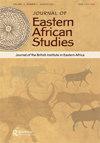Ranger/soldier: patterns of militarizing conservation in Uganda
IF 0.6
3区 社会学
Q2 AREA STUDIES
引用次数: 0
Abstract
ABSTRACT In recent years, several African states have increasingly militarized their wildlife authorities in response growing threats to protected areas (PAs) that come from a range of actors including hunters, poachers, and armed groups. As park rangers now face the overlapping challenges of conservation, law enforcement, and security in PAs, many are provided with paramilitary training, lethal weapons, and sophisticated equipment, often in conjunction with national armies and international actors. Much of the prevailing literature on “green militarization” has done much to advance our understanding of the potential negative consequences associated with the coercive roles of rangers in PAs, but often sidesteps the social, political, and organizational contexts in which park rangers operate. This article presents an interdisciplinary collaboration between anthropology, criminology, and political science that builds a multi-level analytical framework to examine patterns of militarization of the Uganda Wildlife Authority. It considers the political development of Uganda’s wildlife authorities over the longue durée, the attitudes of individual rangers vis-à-vis their coercive roles as agents of law enforcement, and the organization and behavior of rangers at the sub-national level as they engage communities adjacent to Mount Elgon National Park.护林员/士兵:乌干达军事化保护模式
摘要近年来,一些非洲国家越来越多地将其野生动物管理部门军事化,以应对来自猎人、偷猎者和武装组织等一系列行为者对保护区日益增长的威胁。由于公园护林员现在面临着保护区的保护、执法和安全方面的重叠挑战,许多护林员经常与国家军队和国际行为者一起接受准军事训练、致命武器和尖端装备。许多关于“绿色军事化”的主流文献在很大程度上促进了我们对护林员在保护区中的强制性角色所带来的潜在负面后果的理解,但往往回避了公园护林员工作的社会、政治和组织背景。本文介绍了人类学、犯罪学和政治学之间的跨学科合作,建立了一个多层次的分析框架来研究乌干达野生动物管理局的军事化模式。它考虑了乌干达野生动物当局长期以来的政治发展,个别护林员对其作为执法人员的强制性角色的态度,以及护林员在与埃尔贡山国家公园附近社区接触时在地方一级的组织和行为。
本文章由计算机程序翻译,如有差异,请以英文原文为准。
求助全文
约1分钟内获得全文
求助全文
来源期刊

Journal of Eastern African Studies
AREA STUDIES-
CiteScore
3.30
自引率
7.10%
发文量
12
期刊介绍:
Journal of Eastern African Studies is an international publication of the British Institute in Eastern Africa, published four times each year. It aims to promote fresh scholarly enquiry on the region from within the humanities and the social sciences, and to encourage work that communicates across disciplinary boundaries. It seeks to foster inter-disciplinary analysis, strong comparative perspectives, and research employing the most significant theoretical or methodological approaches for the region.
 求助内容:
求助内容: 应助结果提醒方式:
应助结果提醒方式:


